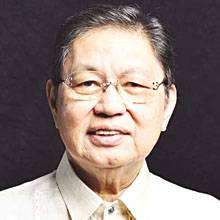THE LEGAL FRONT

With the school opening this August, freshmen law students would experience law school for the first time in their lives. This event should be as exciting and heady for them as it had been for me in 1970, or 53 years ago. Excitement, in my case, started on the first day of class and lasted throughout law school: the demands of law studies, then as now, have always been high and exciting, more so when compounded by the novelty of the turbulence that gripped the nation then.
I savored my initial law school days in the way a provincial student going to school in Manila for the first time would. However, I was not a newcomer to Manila; I had previously worked and studied in Manila but miserably failed to get a college degree. With school prospects in limbo and with a relatively stable job, my attention turned to marriage: I thought that a new marital status would lend stability and keep my thoughts of completing my college education alive. Thus, the first major decision my wife, Tonette, and I made was to return to our home city so I could earn a college degree, and thereafter, to take up law.
With assurances of some support from our parents to augment my salary, we fixed our minds on our high-risk plan as the foundation of our future. As an aside, after my LL.B., my wife also went for her own law studies and added an LL.B. to her B.S. Chemistry degree.
My first day at law school was a quiet one; I simply listened to my new classmates’ spirited exchanges of summer experiences and their shared tips on how we should handle ourselves in class. Contrary to these shared tips, however, our teachers did not simply dismiss our first class after checking attendance. After introductions, they all immediately proceeded to lecture, with warnings about the difficulties to watch for. Every teacher explained his teaching method, grading system, expectations, and the needed preparation for class based on the assigned readings. Classes usually ended with the assignments for the next meeting. Notably, even without the assigned Supreme Court cases, our assigned daily readings ran to more than a hundred pages – a departure from the relaxed college-style approach we were familiar with.
These early instructions became the ground rules and routine for every class day, with some classes heavy with tension as failing recitation grades became the norm for those who could not satisfactorily recite. “What is the question?” was a feared running query as recitations jumped – like a roll call – from student to student. Not keeping up with the running question merited a failing grade.
Thus, the day’s objective for most of us was to get through the recitations without embarrassment and without failing recitation grades. Soon enough, our initial embarrassment faded away; passing grades became our sole concern. This was another departure from the college practices most of us had known.
Under these routines, we met as a smaller class in our second semester, with the class becoming smaller every succeeding year. From our initial three sections of about 120 starting freshmen, we ended up with a graduating class of 40. It was roughly a 66 percent mortality rate, achieved through successive pruning.
Aside from the rigors of law school, we all had to bear the anxieties injected by out-of-school developments. Our law class came at a turbulent time of political activism and demonstrations, rallies, and transport strikes, many of them heavy with student participation.
It was a measure of how serious we had become as law students as we remained unaffected by the noisy outside environment. Very few from our ranks took interest or participated in the rallies and demonstrations. Absences, if any, were for personal reasons, among them, individual efforts in aiding victims of typhoons and calamities.
If at all, we considered the outside developments as unavoidable but bearable distractions – the noisy rallies on our way to school; the delays due to the resulting traffic; and the class suspensions on some days. The media, too, had been very active in their coverage. ABS-CBN Radyo Patrol, among others, actively monitored the developments through on-the-spot reporting of the off-campus disturbances occurring mostly at the university belt.
In our second year (in August 1971), the Liberal Party’s political meeting at Plaza Miranda was bombed, resulting in deaths and injuries, with some prominent personalities as victims. President Marcos responded by canceling the privilege of the writ of habeas corpus, a presidential power we had closely studied in political law.
This bombing was followed by other explosions in other parts of Metro Manila, worsening the already tense Metro Manila situation. Other incidents also contributed to the unrest, among them, the aborted landing of arms by the communists at Digoyo Point in Isabela (the MV Karagatan Incident); the UP Diliman commune; and the raid of defecting army officer Victor Corpus of the Philippine Military Academy armory. All these incidents were legally meaningful to us as law students and inevitably raised our level of anxiety.
President Marcos subsequently declared martial law in September 1972 and arrested some activists and prominent politicians. In school, the initial thrill we experienced under these developments, gave way to deeper anxiety as we realized that the country could be dangerously treading an unbeaten path. Our only consolation came from our constitutional law studies which we appreciated with a big if – if the Constitution would be respected and followed. We thus simply prayed to God for that big if.
In this manner, law school life limped along in those disturbing times, but we did not forget to study and thus academically survived. Our law class hurdled the 1974 Bar examination with a 100 percent passing rate – the result that the incoming 2023 law students should aim for. ([email protected])